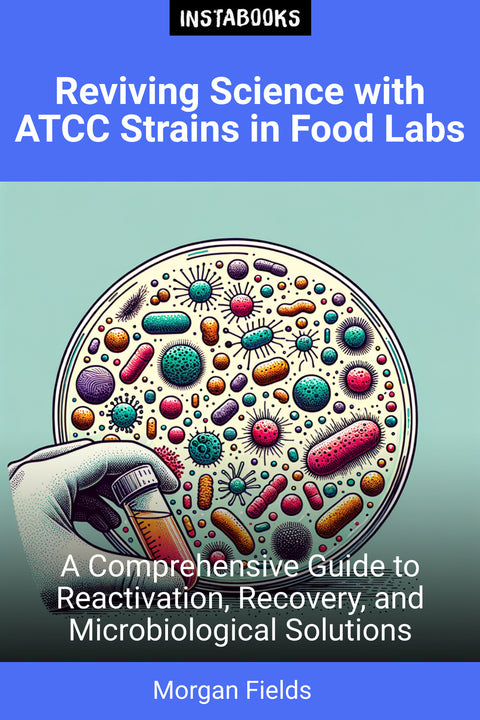
Reviving Science with ATCC Strains in Food Labs
A Comprehensive Guide to Reactivation, Recovery, and Microbiological Solutions
Included:
✓ 200+ Page AI-Generated Book
✓ ePub eBook File — read on Kindle & Apple Books
✓ PDF Print File (Easy Printing)
✓ Word DOCX File (Easy Editing)
✓ Hi-Res Print-Ready Book Cover (No Logo Watermark)
✓ Full Commercial Use Rights — keep 100% of royalties
✓ Publish under your own Author Name
✓ Sell on Amazon KDP, IngramSpark, Lulu, Blurb & Gumroad to millions of readers worldwide
Introduction to ATCC Strains
In the realm of microbiology, the American Type Culture Collection (ATCC) stands as a pillar, holding a plethora of microbial strains that are indispensable for research and application. This book delves into the fascinating history of ATCC, highlighting its foundation in 1925, its growth during challenging times, and its essential role in contemporary science, including its contributions to global health crises.
The Art of Reactivating ATCC Strains
Our journey begins with the step-by-step procedures essential for the reactivation of ATCC strains. This guide details every phase, from receiving frozen materials to selecting the proper propagation hosts. It emphasizes the significance of temperature control and the meticulous handling of materials to ensure successful microbial recovery.
Mastering Stock Culture Recovery
Recovering stock cultures requires precision and care. This section outlines the best practices for handling frozen and freeze-dried materials, as well as the critical quality control measures that must be in place to maintain the viability of microbial cultures. Readers will gain insights into the necessary checks to avoid declining viability.
Innovative Approaches in Microbiological Control Techniques
Understanding drug resistance is crucial in today's scientific landscape. This book explores novel mechanisms of drug resistance, especially concerning Mycobacterium tuberculosis, shedding light on the latest findings and their implications for microbiological practices in food laboratories. Practical applications are emphasized to enhance daily laboratory procedures.
Conclusions and Future Directions
This comprehensive guide concludes with reflections on the importance of continuous learning and adaptation in laboratory practices. With the ongoing evolution of microbiological science, adhering to updated protocols based on the latest research is paramount for success in the field, particularly in food safety and laboratory reliability.
Table of Contents
1. The Legacy of ATCC- Founding Principles of ATCC
- Growth Through Challenges and Innovations
- Recent Developments and Global Contributions
2. Step-by-Step Reactivation Procedures
- Receiving and Thawing Frozen Materials
- Choosing the Right Propagation Hosts
- Propagation in Cell Culture: Best Practices
3. Propagation Techniques and Challenges
- Using Embryonated Chicken Eggs
- Avoiding Common Pitfalls in Propagation
- Ensuring Successful Viral Isolation
4. Recovering Stock Cultures: Methodologies
- Handling Frozen and Freeze-Dried Materials
- Quality Control Measures in Recovery
- Long-Term Storage Solutions
5. Understanding Drug Resistance
- Mechanisms of Drug Resistance in Mycobacterium tuberculosis
- Genetic Factors Influencing Resistance
- Implications for Microbiological Practice
6. Novel Insights into Microbial Control
- Developing Solutions for Food Safety
- Standardized Protocols for Propagation
- Updating Techniques Based on Research Findings
7. Implementing Cryopreservation Techniques
- Best Practices for Cryopreservation
- Rehydration Processes After Storage
- Challenges in Long-Term Cultivation
8. Quality Control in Microbiology
- Regular Viability Checks
- Identifying Storage Issues Early
- Implementing Traceability in Cultures
9. The Future of ATCC in Food Safety
- New Directions in Microbial Research
- Role of ATCC in Emerging Markets
- Collaboration with Global Research Communities
10. Practical Lab Applications
- Daily Lab Practices for ATCC Strains
- Case Studies in Microbiological Control
- Incorporating Research into Routine Protocols
11. Building a Career in Microbiology
- Educational Paths and Opportunities
- Essential Skills for Microbiologists
- Networking and Professional Development
12. Ethics and Responsibilities in Research
- Understanding the Ethical Implications
- Maintaining Integrity in Microbial Research
- The Role of Regulatory Bodies in Microbiology
Target Audience
This book serves microbiologists, researchers, and laboratory technicians seeking in-depth knowledge and practical guidance on ATCC strains and microbiological control techniques in food laboratories.
Key Takeaways
- Insight into the historical significance of ATCC and its role in microbiological research.
- Clear, step-by-step procedures for the reactivation and recovery of ATCC strains.
- Understanding of drug resistance mechanisms and their impact on laboratory practices.
- Practical protocols to maintain culture viability and integrity.
- Guidance on ethical considerations and career paths in microbiology.
